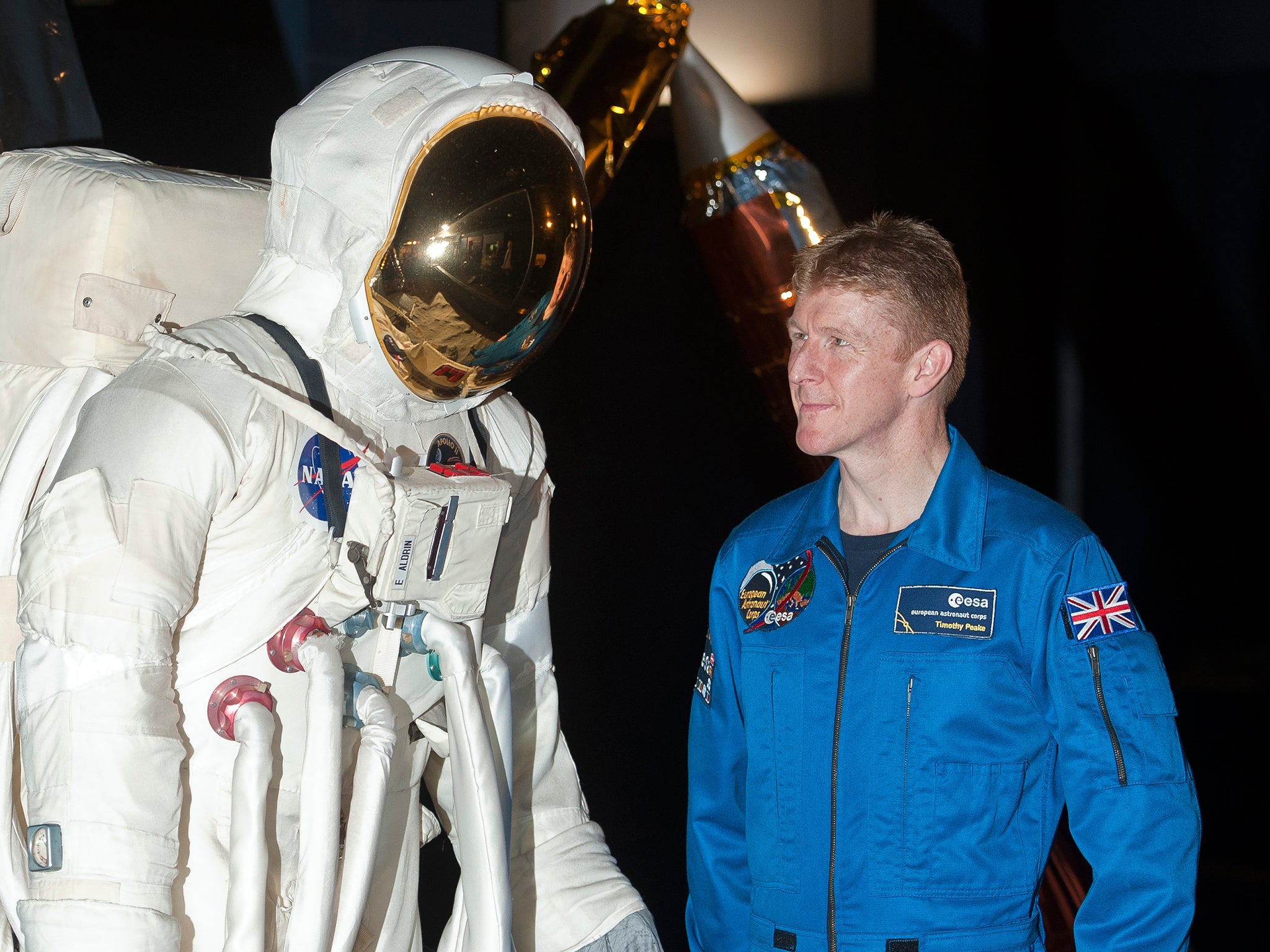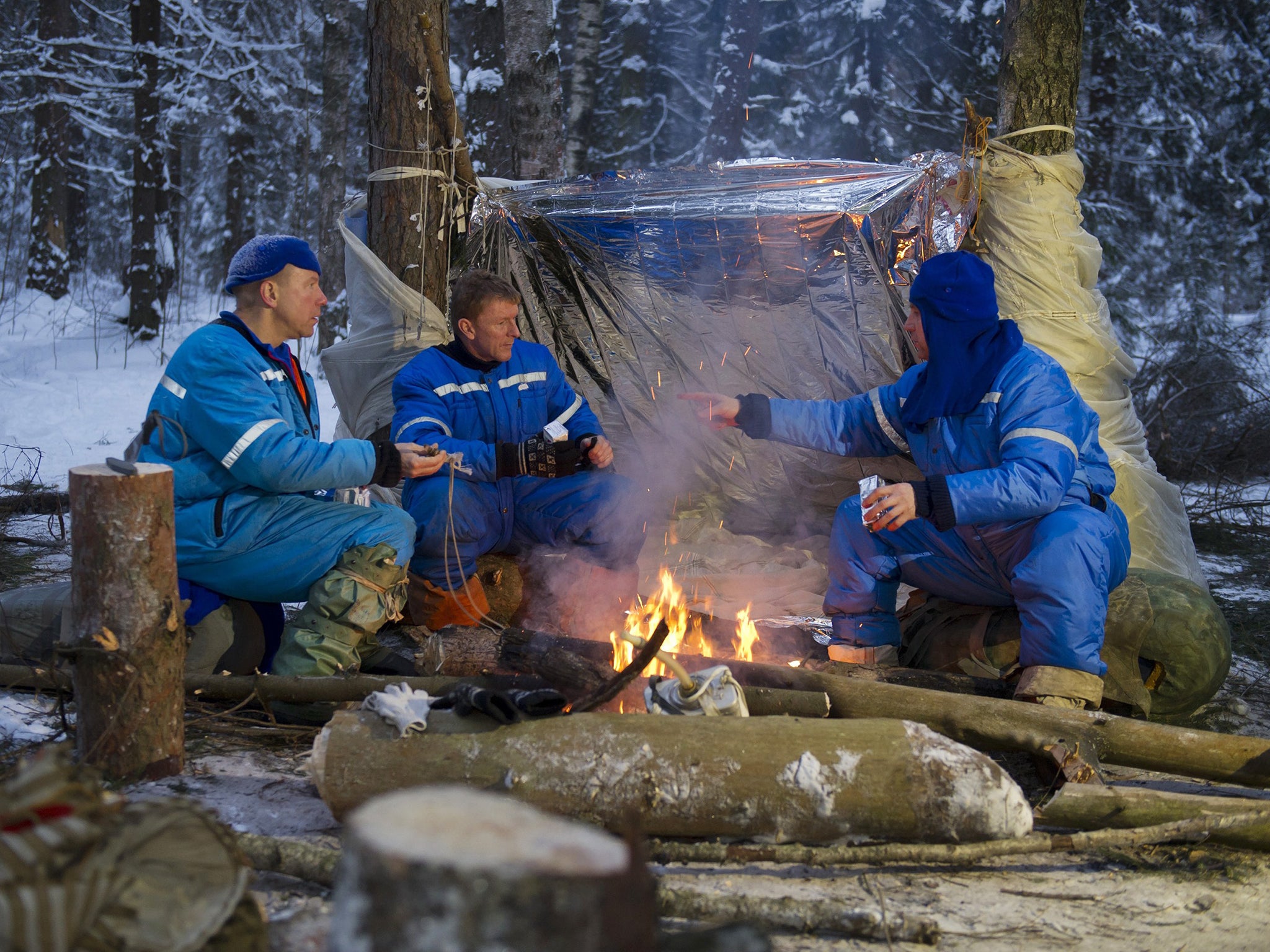Tim Peake: Former astronauts explain why nothing can prepare the Major for the 'gorgeous' views of Earth from space
'You have tears in your eyes and you can’t help but to become a child again'

The final countdown has begun. Next Wednesday, astronaut Tim Peake is set to become only the second “true Brit” to fly in space when he is launched aboard a Soyuz TMA spacecraft from the Baikanour Cosmodrome in Kazakhstan, destined for a six-month stint on the International Space Station.
Major Peake, a former British army test pilot, follows Helen Sharman as the only British citizen without dual nationality to experience space first hand. The 43-year-old father of two from Chichester was chosen by the European Space Agency from a list of 8,000 applicants, and after three years of intensive training he is ready for take-off.
As tradition dictates, he and his fellow crew, Nasa astronaut Tim Kopra and Roscosmos commander Yuri Malenchenko, will spend their last evening on Earth watching the Soviet-era classic White Sun of the Desert, one of the most popular Russian films of all time (and a supposedly relaxing blend of action, comedy, music and drama).
Early on Wednesday morning, they will each sign the door of their hotel room at the cosmodrome – another pre-flight tradition – and receive a blessing from a Russian Orthodox priest before they are strapped into their cramped Soyuz capsule. In the 40-minute wait before take-off, timed for 11.03 GMT, Major Peake has chosen to listen to Coldplay, U2 and Queen to take his mind off the fact that he’s lying on top of a 50-metre high rocket loaded with 300 tonnes of highly explosive fuel.
Once aboard the space station, the three crew members will oversee some 30 on-board experiments. According to Commander Malenchenko, the favourite experiments are those that involve looking out of the window at the Earth 250 miles away – cosmonauts and astronauts alike all say that window-watching is the greatest pastime in space.
Major Peake intends to run a marathon on the space station’s treadmill on the same day of the London event on Earth. As one of the few light-skinned redheads to fly in space, he is also scheduled to take part in experiments involving the effects of solar radiation on his own body.
But it is the prospect of looking out of the space station’s windows that has captivated Peake’s imagination, as it has with generations of space travellers before him.
“I've spoken to a lot of astronauts. They say yes, you're seeing Earth from a different perspective, but you still feel connected to Earth because it's such a large object when you look out of the window,” he told one interviewer recently. He has already worked out an agenda of what to look out for, from lightening strikes and luminous “noctilucent” clouds at night, to the shimmering colours of the aurora borealis, or Northern Lights.
Helen Sharman, who visited the Russian Mir space station in 1991 and has given Peake a book by Yuri Gagarian to take with him, said that looking out of a spacecraft’s window is one of the greatest pleasures any astronaut can experience. She remembers her first window view well.
“I first saw planet Earth from space during the launch. We were over the Pacific Ocean and just looked at that gorgeous blue, dotted with white clouds, and the black of space,” Ms Sharman said in a series of interviews with astronauts as part of the Royal Institution’s advent space calendar.
It takes about 90 minutes for a space station to orbit the Earth. During that time the planet has tilted by another 13 degrees, which reveals a new view over the surface for the next orbit, Ms Sharman said.
This is another reason why window watching from space can never boring. “It’s entrancing. This constantly moving Earth is something that nobody ever gets tired of looking at,” she said.
Veteran Nasa astronaut Michael Barratt, who flew on a 2011 Shuttle mission, said that the senses become overwhelmed by the sight of the Earth from the distant perspective of space. You can clearly see the curvature of the horizon, the blueness of the planet, the thinness of its atmosphere and the deep blackness of space.
“This impossibly blue planet in this impossibly black sky kind of hanging out there…it is really, really breathtaking. It is this perpetual, dynamic picture show that you never get tired of, even six months into the flight,” Barratt said.
“As you pass by the window it’s like a magnet that draws you to it. You want to pick up a camera and take pictures of it. You could spend hours a day for months looking out of the window and never get tired of it. You never learn all of it. The Earth is very dynamic…There’s always lightening storms going on somewhere on the Earth and at night you can never fail to see these lightening flashes,” he said.
Night-time lightening is something that Sharman remembered too, especially as the flashes often occur one after the other in a series of repetitive pulses. “It lights up a whole circle of clouds around it and that seems to set up another flash a few hundred miles away somewhere else,” she said.

But Sharman, like so many astronauts, found that the view from a window in space triggers much deeper emotions. “You look at that vastness of infinite stars and that’s when you begin to realise how insignificant not just you as an individual are but how insignificant the Earth is, how insignificant the whole human race actually is,” Sharman said.
European astronaut Jean-Francois Clervoy said that even though we have all seen images or movies of the Earth from space, nothing can prepare you for the real thing once you are travelling over the planet’s surface at a speed of 8km per second. The most striking thing is that planet seems like another spaceship, with all the vulnerability of being alone in space, he said.
“You can’t avoid the comparison between the Earth looking like a finite object before your eyes and your own spaceship which is closed with limited resources. All humankind are part of the same, unique crew,” Clervoy said.
“You have tears in your eyes and you can’t help but to become a child again.”
Join our commenting forum
Join thought-provoking conversations, follow other Independent readers and see their replies
Comments